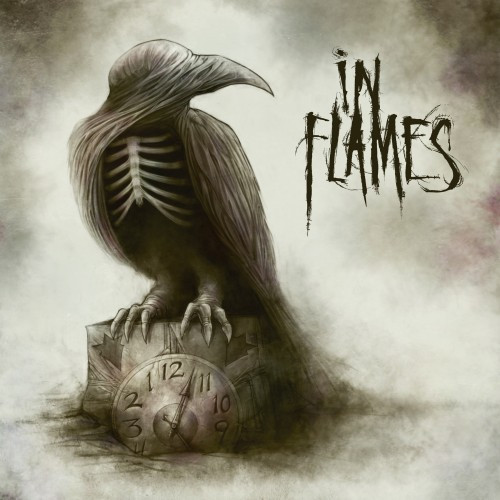
(NCS writer Andy Synn reviews the forthcoming album by In Flames in detail.)
Ladies and gentlemen, I began listening to Sounds Of A Playground Fading with a sense of cautious optimism, tempered by the reluctant pessimism one might expect after the woeful quality of In Flames’ last album. Optimistic I was, as the songs I’d previewed (in full or in part) already had demonstrated clearly that the vocals and guitars at least sounded better, fuller, more nuanced, than on their previous record, but pessimistic I remained, as the last record also demonstrated how easily and quickly the band can squander any promise they may have shown.
I’ve been a huge fan of In Flames for almost as long as I’ve loved metal; although I’m perhaps not elitist enough to claim that their early material is always their best (both Lunar Strain and Subterranean are good records yes, but don’t click with me as much due to their more primitive origins), I do acknowledge the (mostly) undisputed classic status of their pre-millennial works. I love The Jester Race, Whoracle, Colony and Clayman. I love Reroute To Remain due to its great songs and despite (and perhaps because of) its flawed nature.
Soundtrack To Your Escape is a good album, with some good songs, but it’s not necessarily an In Flames album in many ways. Its identity is confused and conflicted. Come Clarity is a brilliant record with particularly great highs but an occasionally frustrating sense of treading water. A Sense Of Purpose is an awful, unfocussed mess that puts the lie to its own title. Lacking any breadth or depth, the songs rarely develop naturally, with little or no room to breathe. So as of yet, it seemed that the new, post-millennial identity of In Flames, their modern sense of purpose, remained nebulous and undefined.
With Sounds Of A Playground Fading, In Flames have arguably (and finally) entered a post-modern phase of existence, something that has been coming for a long time. They are no longer the same entity they once were, that’s for certain, but they have made confident steps to define their new identity with this release. Some key elements remain/have returned, in particular the liquid, soaring solo sections which have regained welcome prominence, but more than anything the band have finally fully committed to making their new sound just as good as their old sound, instead of dwelling on simply being adequate. (more after the jump . . .)
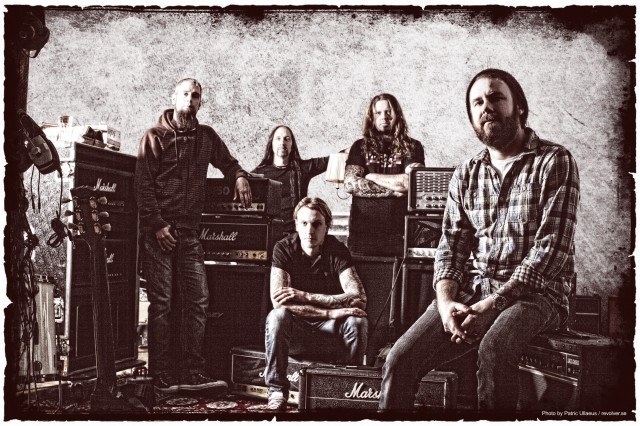
First track “Sounds Of A Playground Fading” eases the listener in with some beautifully performed acoustic work, fulsome with subtle promise and an ear for memorable melody. The smile it engenders upon breaking into a soaring IF lead refrain is unavoidable. The sudden break into crunchier, modern riffing is a shock indeed, but this quickly passes due to the fact that the riff itself is a high quality head-banger, thicker in tone yet more expansive than any of the stunted efforts from A Sense Of Performance.
The nimble string-skipping riffs and agile drumming make the verses a pleasure to listen to and absorb throughout and, while I’m on the topic, how nice is it that since Come Clarity, Daniel Svensson has had a proper drum sound by the way? If nothing else, this record may well see the man being given his punchiest, thickest sound yet, thrusting his performance to the prominence it has so long deserved.
The bridge is characterised by some great, complex lead work, duelling melodies of winding guitar leads and insistent, wah-flecked soloing, each flawlessly accenting the other, while the pummeling, down-tuned riffing that concludes the song is a welcome injection of heaviness that allows it to end on a poweful note.
“Deliver Us” paradoxically exemplifies the In Flames of a post-In Flames world, a crunchy stabbing guitar line melded with some shining lead work and a soaring chorus from Anders Fridén, who sounds more passionate here than he has in years. Once again, I love the drumming on this track, the less compressed arrangements of riffage and song structure giving the drums a chance to extemporise and add tonal textures to the track, rather than simply keep the beat.
The keys as well these days are sitting much better in the mix, constantly on the edge of your hearing and serving to enhance the sheer strength of the guitars, rather than apologise for their weakness. It’s a catchy number start to finish, from its sky-scraping chorus to the stompy, electronically accented verse riff that manages to match a modern aesthetic to a classic In Flames lead part without losing the identity of either.
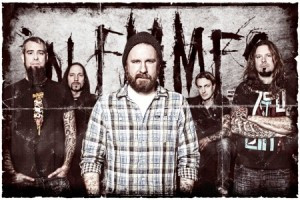 Some classic, energetic clean guitar opens “All For Me” before a colossal rhythmic riff powers its way onto the field. The staccato verses feature stomping, mechanical guitars offset with a dizzying lead line unobtrusively spiralling in the background, recalling the intro’s quick-step melody and vibrancy. An epic vibe is evoked by the grandiose chords and thrusting keyboard licks, with Fridén’s vocal work being of particular quality during the bridge where he trades ragged, passionate clean vocals with a subtle, morose lead part.
Some classic, energetic clean guitar opens “All For Me” before a colossal rhythmic riff powers its way onto the field. The staccato verses feature stomping, mechanical guitars offset with a dizzying lead line unobtrusively spiralling in the background, recalling the intro’s quick-step melody and vibrancy. An epic vibe is evoked by the grandiose chords and thrusting keyboard licks, with Fridén’s vocal work being of particular quality during the bridge where he trades ragged, passionate clean vocals with a subtle, morose lead part.
This is a very Clayman-esque song in many ways, with a strong thread of specific melody running through it, one that is explored and expanded upon by the various different iterations that appear throughout the track, allowing it to maintain a solid consistency as well as a fresh and freeing clarity.
“The Puzzle” has a death-metal-leaning beginning and a speedy, desperation to the verses, the drums and stuttering guitar riffs almost falling over themselves in their rush to push the song ever forwards. The introduction of whipping tremolo guitars serves to enhance this impression of frenzied creativity, the song feeling as if it came into being quickly and organically in the practice room, without recourse to over-thinking its approach.
The rock-solid core of the chorus and bridge sections is once again the titanic drumming of Daniel Svensson, his tight kick patterns locking the chorus into an angular, spiky shape, while his pounding drums fills give the bridge a restrained, tribalistic intensity which allows the prominent lead guitar to soar unfettered.
The proggy ending adds a totally unique flavour to the song’s outro that, rather than clashing with the more aggro tendencies previously displayed, gives the music a sense of linear progression and cohesion, a warm bass-line flowing languidly beneath shimmering keys and lead guitars.
“Fear Is The Weakness” has a calm, collected opening that soon morphs into a marching, staccato riff pattern and emotive lead guitar section. The song’s vibrant verse sections rely less on metallic power than on emotional depth, focussing on weaving melodious lines of crystal clear lead guitar throughout, ably supported by the reassuring presence of crunchy riffs.
The chorus is an insistent gem of honest, believable vocals, flowing guitar leads and shimmering keys, which build upon the rock solid foundation of Peter Iwers and Daniel Svensson’s rhythmic double-act. Pay particular attention to the short, but perfectly composed guitar solo which crowns the song’s mid-point, its relative simplicity belying the depth of emotion which spills from its weeping strings.
 One thing these songs so far all have in common (apart from their high quality) is that they each sound as if they were written for the band themselves, rather than for some external source. The riffs, the drums, the bass and vocals all harmonise perfectly with one another, the band performing as more of a self-sustaining, coherent entity than the distracted, divided entity which struggled blindly on through previous years of self-loathing and self-doubt, unsure of its place in today’s metal world.
One thing these songs so far all have in common (apart from their high quality) is that they each sound as if they were written for the band themselves, rather than for some external source. The riffs, the drums, the bass and vocals all harmonise perfectly with one another, the band performing as more of a self-sustaining, coherent entity than the distracted, divided entity which struggled blindly on through previous years of self-loathing and self-doubt, unsure of its place in today’s metal world.
To hammer this point home, “Where The Dead Ships Dwell” is a more expected modern-day In Flames track, but one performed with renewed verve and confidence. The lost years spent wandering in the wilderness, searching for a new identity, have paid dividends here, the band expressing a new-found drive and vigour that sees them addressing their fragile place in the world, but no longer wallowing in fear and self-doubt.
The clever use of interesting guitar effects and Peter Iwers’ noodling, intriguing bass lines bring a warmth and consistency to the body of the song, while the firecracker drums and sky-rocketing solo section have a life and vibrancy to them that their last album was missing almost entirely. The buoyant duelling guitars and weaving finger-patterns build a memorable story of their own in the middle of the song, while the animated (and primarily clean) vocals come across with a great deal of zest and emotion, the lyrics addressing themes of frustration and stagnation in a manner that suggests In Flames have finally put these demons to rest.
“The Attic”, purportedly the oddest song on the record, begins with a pulsing electronic heartbeat and an odd, jazzy lead guitar, before Anders introduces the lines “Someone in the attic/ Building a strange machine” in a strained, melancholy whisper. The sad accordion melody which serves as the song’s chorus is definitely a nice touch and brings a wistful sense of loss to the proceedings while the use of familiar snippets of classic In Flames melody seems a conscious choice to recall the better days of the band’s youth, an innocence long gone but remembered with a hazy, warm feeling of pride.
“September’s here again” screams Anders on “Darker Times”, a very Reroute To Remain-esque, upbeat number with a buzzing, electric main riff and rolling, tidal drums. Punchy and dark, the song sparks with barely suppressed frustration, controlled explosions of caustic riffs, some thick and down-tuned, others sharp-edged and scything, and laser-guided melody, feeding the engine which drives the song. The patient, self-assured chorus shows the band firing on all cylinders, while each of the several solos present adds a different character to the song as a whole.
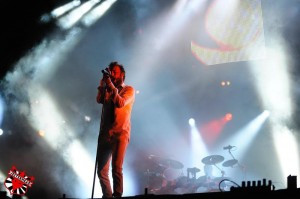 The compressed, radio-effect break near the end of the song cements the its (positive) relationship with Reroute To Remain-era In Flames material, once again suggesting that this album as a whole more embodies the positive lessons of modern-age In Flames, as opposed to a futile effort to simply replicate the glories of the band’s Golden-Age period.
The compressed, radio-effect break near the end of the song cements the its (positive) relationship with Reroute To Remain-era In Flames material, once again suggesting that this album as a whole more embodies the positive lessons of modern-age In Flames, as opposed to a futile effort to simply replicate the glories of the band’s Golden-Age period.
Beginning with a sparkling, effervescent lead melody, “Ropes” recalls the unfulfilled promise of Fridén and Niclas Engelin‘s aborted Passenger project, but granted a gleaming, streamlined chassis of metallic force. The former’s vocals are front and centre for much of the track’s length and delivered with a sense of vitality and sensitivity which elevates the track, while the guitars are less interested in crafting big slabs of riffage and instead focus on exploring a greater field of expression and crafting layers of full-bodied emotive texture.
The chorus has a contained, mature power all its own, constructed of big slabs of brawny guitar and snappy, energetic drumming which contrast well with the song’s otherwise collected reserve. From start to finish, the band flawlessly exhibit the best of their modern light-and-shade approach to song-writing, the flowing arrangement and pulsating heartbeat of the song a pleasure to experience.
“Enter Tragedy” would fit almost perfectly with the material from Come Clarity were it not for the fact that it is perhaps a shade too heavy and direct, with subtle keyboards too perfectly enmeshed into the song to be considered a simple stylistic regression. The crackling, electric riffs take on an extra sense of urgency during the propulsive verses, accented by swirling electronica and booming, reverberating drum beats.
The multi-layered screams of the first chorus lead smoothly into an emotive, yet playful, solo, while the second iteration of the song’s central thematic refrain moves into a heavier, more severe arrangement of backbreaking chugs and ringing, tyrannical chords, into which the band places a brooding, yet spirited, solo break, unafraid to mix light and dark in equal measure. Clearly, even the more “standard” modern-In Flames material like this and “Where The Dead Ships Dwell” have benefited from the band’s therapeutic redesign and re-ordering of their key principles.
Originally, I thought that the whiskey-soaked ambience and pulsing electronica of “Jester’s Door” constituted a rather glaring mis-step on the band’s part. Yet I’ve concluded that, against all the odds, it works somehow. It’s certainly not a predictable move on their part, but actually serves to poetically encapsulate the album’s central themes of personal growth and the redefinition of adult ideals.
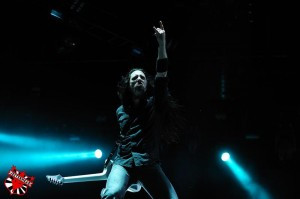 Through an almost stream-of-consciousness spoken-word delivery, Anders Fridén ruminates abstractly on the nature of the band’s past (“I went from wreckage, to world class”), their present (“But times have changed, and I have to defend my actions”), and their potential future (“I say I love you all, as I vanish through the Jester’s Door”).
Through an almost stream-of-consciousness spoken-word delivery, Anders Fridén ruminates abstractly on the nature of the band’s past (“I went from wreckage, to world class”), their present (“But times have changed, and I have to defend my actions”), and their potential future (“I say I love you all, as I vanish through the Jester’s Door”).
Storming in on the back of a stunning lead refrain,“A New Dawn” once again calls back to the under-appreciated classic Reroute To Remain, Anders’ vocals sparkling with a youthful energy whether delivered through the medium of raging screams or mournful singing. The luminous power of the speedy leads and crashing waves of riffage are superbly matched by the folk-derived melodic power that underpins the track. The steady march of the verse riffs gives way to a dreamy, ethereal pre-chorus and a massive, multi-layered chorus of introverted character and extroverted flair.
The meditative calm of the mid-section mixes blissful lead guitars with ambitious string arrangements to give the song a larger-than-life appeal. Most interesting of all, these strings continue to play a key role throughout the song’s second half, matching the fiery metallic zest of the band’s delivery, beat for beat.
Final track “Liberation” begins very unexpectedly, the wistful, minimalist guitars echoing over a simple, restrained drum beat, once again bringing to mind the 80’s-influenced experimentation of Fridén and Engelin’s Passenger project. The chorus is reminiscent of U2 in many ways – again, In Flames themselves have never denied the large 80’s rock and electronic influence of their music, something which seems a very culturally relevant matter in many of their Swedish peers – but perhaps too overtly poppy for an album which, although full of melody, has thus far carefully walked the thin line between soaring, infectious refrains and progressive, layered melody without delving into more simplistic and direct realms for solace.
Perhaps a slightly more sedate closing song than the album deserved, the track does still have its moments, the reverberating, clean-picked introduction and extended outro evoking a moody progressive vibe, while the squalling solo is a fiery storm of roiling emotions amidst the song’s otherwise calm and tranquil oceans.
Overall, this album strikes me as a much more personal, interesting piece of work. It truly feels like the band have put more of themselves into this record, both musically and lyrically, resulting in a deeper and more rewarding experience for both creators and their devoted listeners, with more emphasis on interesting guitar work, expressive soundscapes and organic, shifting moods.
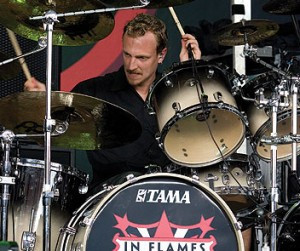 If there is one particular hero of note, it would have to be Daniel Svensson, whose nuanced and energetic drumming is never overbearing, but always noticeable and welcome. Yet at its heart the record remains much more of a collaborative effort, full of the sorts of melodies and riffs that most bands half their age would attempt, and fail, to make interesting, lacking as they do that indefinable aura that these particular individuals bring to the table. There’s something so distinctly and specially In Flames about these songs that make them greater than the sum of their, not inconsiderable, parts.
If there is one particular hero of note, it would have to be Daniel Svensson, whose nuanced and energetic drumming is never overbearing, but always noticeable and welcome. Yet at its heart the record remains much more of a collaborative effort, full of the sorts of melodies and riffs that most bands half their age would attempt, and fail, to make interesting, lacking as they do that indefinable aura that these particular individuals bring to the table. There’s something so distinctly and specially In Flames about these songs that make them greater than the sum of their, not inconsiderable, parts.
Anders Fridén, so often the band’s greatest weapon and, simultaneously, their greatest weakness, sounds more “present” on the recording than perhaps ever before, giving his all throughout, pushing his vocal talents and challenging his limitations to achieve better throughout. His lyrical digressions are intelligent — romantic ruminations on the very emotive and affecting topics of age and childhood, time spent “walking an endless mile” toward an unknown end, or days spent “hiding in the attic” from tenebrous, childhood fears all presented with a gruelling emotional honesty in all their harsh reality and stark beauty.
The album’s title is apt in many ways, the band perhaps finally having left childhood behind – and not just the childhood of their early ears, but the mid-life childhood regression phase which seemed to threaten both their career and musical integrity – not so much abandoning the past, but learning from the successes and mistakes they made both in their early days and with their more recent, controversial efforts. Perhaps it was the loss of Jesper Stromblad and the inclusion of Engelin that served to re-invigorate the band, helping them to take such a stark look at themselves, where they came from, where they had been along the way and, most importantly, where they were going. If one were to look upon albums like A Sense Of Purpose and (the somewhat under-rated) Soundtrack To Your Escape as the necessary mistakes of a band going through an unavoidable second-childhood, then Sounds Of A Playground Fading symbolises the new maturity they have gained as a result of fortitude and perseverance.
Whereas their most closely related peers, Soilwork and Dark Tranquillity, seemed to make the transition from pre-millennial folk-infused Swedish melodic death metal (my that’s a mouthful) to futuristic cyborgs of gleaming, modern metal power, old souls in new bodies, for In Flames the same path has been far more convoluted and difficult. Yet finally, in a move which mirrors the creation of both “The Panic Broadcast” and “We Are The Void”, Gothenburg’s favourite sons have produced what may well be the finest moment of their post-transition career and potentially provided a keystone for the foundation of an even brighter future for themselves.
EDITOR’S NOTES:
Sounds of A Playground Fading will be released by Century Media on the following dates:
Germany, Austria, Switzerland, Norway: Friday, June 17
Finland, Hungary: Wednesday, June 22
Spain, Italy: Tuesday, June 21
Rest Of Europe: Monday, June 20
North America: Tuesday, June 21
Australia, New Zealand: Friday, June 24
Inevitably, a few songs from the album have unofficially appeared on YouTube. Here’s the album’s title track:
http://youtu.be/Kh53X2AbRx0
UPDATE: Just saw this video of In Flames performing “Deliver Us” live in Berlin on June 1. The A/V quality is pretty good, and this is one very infectious song:
In Flames has also announced the initial dates for a fall tour. Here’s what we have so far:
September 2011 (Headline shows – support TBA):
14 – Santiago – Sala Capitol – Spain
16 – Madrid – Riviera – Spain
17 – Bilbao – Rockstar Live – Spain
18 – Barcelona – Razzmatazz – Spain
20 – Lausanne – Les Docks – Switzerland
22 – Hohenems – Event Centre – Austria
25 – Budapest – Petofi Hall – Hungary
26 – Zagreb – Boogaloo Club – Croatia
27 – Milan – Alcatraz – ItalyOctober 2011 (Headline shows – support TBA):
26 – St Petersburg – Glavclub – Russia
28 – Yekaterinburg – Tele Club – Russia
29 – Moscow – Milk Club – Russia
30 – Kiev – DK Nau – UkraineNovember 2011
21** – Ludwigsburg – Arena – Germany
22** – Offenbach – Stadthalle Offenbach – Germany
23**- Munich – Zenith – Germany
25** – Oberhausen – Turbinhalle – Germany
26** – Hamburg – Sporthalle – Germany
27** – Brussels – AB – Belgium
28* – Paris – Olympia – France
30* – Tilburg – 013 – Holland** Headline show with Trivium as special guests + Ghost, Rise To Remain & Insense
* Headline show with Trivium as special guest (the rest of the line up to be announced shortly)

Very interesting write up, I guess I’m going to have to listen to this one now. I was skeptical at first, especially after the mess that way A Sense of Purpose, but you’ve given me faith!
I have to weigh in here, since, probably more so than any other band, In Flames was my gateway into metal. I think Andy hit the nail on the head: In Flames has moved beyond the music that first hooked me, and they’re not going back, but this album shows a high level of quality and self-assurance in their new sound. It’s leagues better than A Sense of Purpose. As Andy notes, the guitar leads and solo’s and the drumming are especially good and Anders’ vocals, in the main, are outstanding.
I don’t love every song on the album. For example, I thought “Jester’s Door” was self-indulgent and the album would have been better without it, and “Liberation” is too close (for my tastes) to the kind of music I’d expect to hear from a pop rock band like U2 or Coldplay. On the other hand, “Deliver Us” just continues to grow on me. Massively infectious, that song, and the verse riff and chorus of the title track are also getting nicely stuck in my head. I’m also enjoying the gritty aggression in “Enter Tragedy” and “All For Me”, as well as the beautiful guitar performances in “Fear Is the Weakness”.
In short, if you’re an old In Flames fan who began to drift away after the last album, it’s time to come back.
“Liberation” was my only disappointment. I did try hard to find some good bits, and yes they are there… in fact it’s not even a bad song, but it doesn’t sit quite right with the rest of the album. It is indeed the only obviously “pop” influenced song.
Whereas their most closely related peers, Soilwork and Dark Tranquillity, seemed to make the transition from pre-millennial folk-infused Swedish melodic death metal (my that’s a mouthful) to futuristic cyborgs of gleaming, modern metal power, old souls in new bodies, for In Flames the same path has been far more convoluted and difficult.
That was a convoluted and difficult sentence, Andy. Good read overall, but I’m still not sure where you were going with the above sentence.
On re-reading it was yeah. Probably should have removed, or just moved, the “old souls in new bodies” line. I jsut liked it a lot. Should have used it elsewhere though.
Wow! Incredibly detailed review here – no stone left unturned. Also, I am that you didn’t bag on the ‘Reroute To Remain’ and ‘Soundtrack To Your Escape’ albums as much as it seems rather “vogue” to do. They both have great songs in them and great layering throughout (and I say that, like you, anchored into ‘Jester Race’ as my main sweet spot for IF).
When you see the lyrics of The Jester’s Door, don’t you think it’s related to Jesper ? (I haven’t heard the full track, just a small preview, but a friend of mine told me this)
I found an interesting interview Anders gave about the album. He discussed “Jester’s Door”, which the interviewer thought was a tip of the hat to the band’s past, their 1996 breakthrough album The Jester Race in particular:
“Could be,” laughs Friden, who debuted as In Flames’ frontman on The Jester Race. “I want to keep it open to interpretation, but it came about because of the lyrics. The track had to be those 10 or 12 lines. I couldn’t make it into a whole song, they were perfect the way they were. As we were recording the album, we had to come up with a song order very early on and keep it that way. Having an album feel was very important to me. It had to have a certain flow, you could almost imagine it as having an A-side and B-side, like an LP.”
“That song, for the dynamics, was meant as a breather; both ‘Jester’s Door’ and ‘The Attic’ were. For me, ‘Jester’s Door’ is an ode or a thank you to the world for giving me the opportunity to do this. I did an interview with a guy who said that I sound bitter and pessimistic on that track, and I was surprised. That was never my intention, but that’s his interpretation and that’s fine. That track could also be a beginning or an ending… I entered on The Jester Race and I now I leave through the Jester’s Door (laughs).”
“Or it could be about someone else,” Friden adds. “I’ve left it open…”
Here’s the full interview:
http://carlbegai.com/2011/05/15/in-flames-behind-the-jesters-door/
I like the lyrics to the song a lot, in fact I think the lyrics on the album as a whole have taken a step up, with a lot more evocaive imagery and several different possible interpretations available.
And yes, “Jester’s Door” could be either Jesper or Anders speaking, one leaving through the Jester’s Door, the other entering it to pursue a new phase of In Flames.
Faith, a strange word from the fingers of an atheist, is hard to come by these days where reviewing music on the internet is concerned. So many people seem to be waiting for the fall of something that was once great. I was lucky enough to come across Colony when it came out and wore the disc into a coaster. I remember when Reroute came out and everyone back then said In Flames was done. The same was said with Soundtrack, etc… I still listened though because there was still that connection there for me, and the missteps where awkward and at worst bland but the successes were still goosebump inducing. It seems like Andy has held the same, ahem, faith I always held that they would persevere. It was great to read that pay off for you in this review, and I hope I get the same. “Deliver Us” indeed.
Really nicely written. Thanks man.
MUSIC- 9 VOCALS- 3
This album has the feel of older in flames great guitar and drum work, I’d say in flames is back if… the vocals weren’t terrible. It sounds like Anders forcing heavy singing, there isn’t one scream on the album! All the vocals are, are his new let me sing and try to sound heavy vocals. Why doesnt he do screams on this album? Is it like fagtallica not doing solos on st anger. Anders is stupid the old fans which there isnt many anymore and the emo soundtrack kids all liked his screams who is he trying to appeal to now? I couldnt tell you It sounds like he has a dick in his Mouth!
Well… that was an unnecessarily homophobic comment.
Particularly since all the best producers know that giving a great hummer to the vocalists while they’re recording is the best way to keep them in tune.
This answers so many questions. A producer’s job is even more difficult than I thought it was.